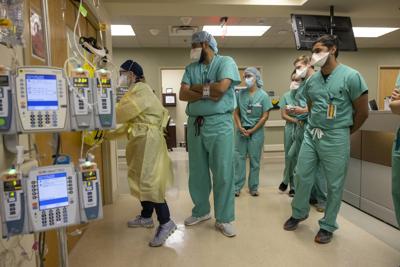Familiar scenes are playing out in hospitals across Louisiana as omicron continues to prompt more people to seek care: emergency rooms are slammed with patients and wait times are long; health care workers are out sick with COVID or just burned out; the ones that remain are exhausted and frustrated.
Short-staffed hospitals due to the coronavirus are not new in Louisiana. But even as hopes rise that the omicron wave may crest in coming weeks, data show that staff shortages are reaching critical levels, sapping the empathy and energy of health care workers in the midst of the state's fifth major outbreak.
In Louisiana, 27% of hospitals are experiencing a critical staff shortage as of Thursday, according to data published by the U.S. Department of Health and Human Services, amid rising COVID infections among doctors and nurses and a long-running shortage of health workers. There haven't been this many Louisiana hospitals at critical staff levels since the delta variant hit the state in August and September.
Coronavirus cases continue on a sky-high trajectory in Louisiana, even as scientists are seeing signs of a plateau in the omicron wave in some…
About 17% of all hospitals in the U.S. reported critical shortages as of Thursday.
“This is a horrible loop that we find ourselves in again and again, with what seems to be fewer resources, fewer attention and fewer concern in general,” said Dr. Jennifer Avegno, head of the New Orleans Health Department, at a news conference this week.
Avegno, who also works as an emergency medicine physician at University Medical Center, described patients waiting in hallways, staff outages in the triple digits at some of the state’s larger hospitals and up to 12 hour waits just to be seen in emergency rooms.
Hospitalizations in Louisiana have climbed faster in the past two weeks than any other state – an increase of 237% compared to the U.S. average of 79%. Since the start of the year, the number of patients with COVID in hospitals has increased by about 90 per day, for a total of 2,173 statewide.
The highly infectious Omicron variant is changing the way Louisiana hospitals operate, with canceled surgeries, bottlenecked emergency rooms a…
Dr. Josh Denson, associate director of pulmonary and critical care medicine at Tulane University School of Medicine, said that the omicron variant, which studies show is milder on average than earlier mutations, hasn't put as great of a burden on intensive-care units. But he prickles at the characterization that omicron isn’t causing severe illness.
“Is it mild? No,” said Denson. “I have a handful of people dying in the ICU that have been dying for weeks.”
Denson estimated that around a quarter of the attending ICU doctors in University Medical Center are out with COVID.
Hospitals stopped quarantining for exposures long ago, or else everyone would be out, Denson said.
Still, there are glimmers of hope for health care workers.
A day after Louisiana notched a new pandemic record for COVID-19 infections, Gov. John Bel Edwards decided Thursday not to issue a statewide m…
The latest numbers released by the Louisiana Department of Health on Friday show the weekly count of confirmed cases at 59,689. That's an increase of just 4% compared to last Friday's count, a sign that the fifth wave may be starting to slow its explosive growth statewide.
There are more encouraging signs in New Orleans, where the omicron outbreak was first concentrated in Louisiana. Though the weekly case count of 6,443 in the city is still more than twice the totals reported in any week of the pandemic before the omicron variant emerged, it also marks a 33% drop over the all-time high reached seven days ago.
There was a “different feeling” in the emergency room at Ochsner Health’s main campus this morning, said Dr. Robert Hart, chief medical officer.
“They didn’t have quite the volume they’ve been seeing,” said Hart. “The beds weren’t quite as tight.”
Last week, Omicron, the new extremely contagious variant of COVID-19, seemed to be spreading everywhere in Louisiana but one place. However, i…
Numbers are looking much better for staffing, too. At the peak, over 1,400 employees were out with COVID during the omicron wave. Now it’s down to about 900, he said.
Still, Hart noted that hospitalizations are not down across all hospitals in Ochsner's system. While the burden is lessening in New Orleans, the north shore and Lafayette are also still seeing increases. And the emotional toll of a fifth surge has left its mark on employees.
“People were just beginning to breathe a sigh of relief that maybe this is gone, and then have this omicron come back,” said Hart. “The way it went up so quickly, that was very scary to people.”
Hospital staff typically see a patient’s wins as their wins, said Dr. Kara Ward, who specializes in pulmonary critical care and emergency medicine at Louisiana State University Health Sciences Center. But because the losses have been so vast for COVID patients, health care workers find themselves just trying to make it through their shifts.
“It's not that we don't care,” said Ward. “But it's becoming harder to care.”
Staff writer Jeff Adelson contributed to this report.








